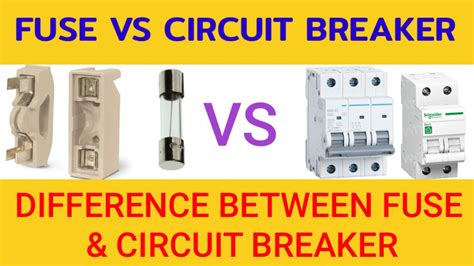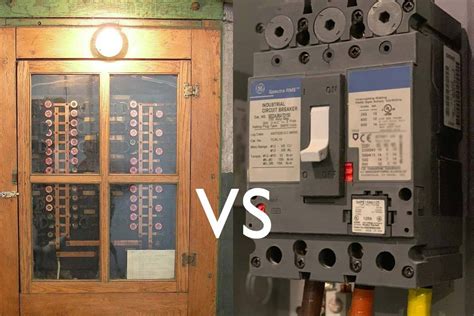electrical fuse box vs circuit breaker Both circuit breakers and fuse boxes are part of your home’s electrical panel, and they are in a metal service box that accepts power from your utility company. Circuit breakers have rows of . A junction box is an essential part of the electrical wiring systems for homes and commercial buildings. These metal or plastic boxes house and .
0 · fuses vs circuit breakers advantages
1 · fuse vs circuit breaker difference
2 · fuse block vs circuit breaker
3 · ext 244 20 circuit breaker
4 · electrical fuses vs circuit breakers
5 · electrical fuse box circuit breakers
6 · circuit breaker and fuse difference
7 · 12v circuit breaker vs fuse
So we constructed a backstop that could easily stop a stray .22 round if I missed my target. The backstop is a box made from pressure-treated wood. The front and back are a 4’x4’x1/2″ panels cut from a standard 4’x8′ sheet of pressure-treated plywood. The sides are pressure-treated 2×12’s.
A fuse box and circuit breaker are electrical components that allow you to turn off power in your home. They do, however, differ in some .The main difference between a circuit breaker and a fuse box is that a circuit breaker can be reset after it trips, while a fuse needs to be replaced. A circuit breaker is designed to protect your home’s electrical system from overload by .Both circuit breakers and fuse boxes are part of your home’s electrical panel, and they are in a metal service box that accepts power from your utility company. Circuit breakers have rows of .The main difference between a fuse box and a circuit breaker is that fuses need to be replaced when they “blow”, whereas circuit breakers can simply be reset. Fuse boxes are usually cheaper upfront but require more maintenance, .
Fuses and circuit breakers are both designed to ensure the safety of electrical circuits in a home. While both fuses and circuit breakers share similar characteristics, there .Fundamentally, both circuit breakers and fuse boxes serve similar purposes – they protect your home’s electrical system and appliances from excessive currents or electrical faults that could .
Fuse Box vs Circuit Breaker: Considerations. When choosing between a fuse box and a circuit breaker, consider your budget, convenience, home age, safety, and electrical needs. Fuse boxes are budget-friendly but less convenient, while . The fuse box and circuit breaker electrical panel aren’t the same since fuse boxes are designed to hold only fuses and are smaller than the latter. That being said, there’s technically no such thing as old style fuse box circuit breakers. A fuse box and circuit breaker are electrical components that allow you to turn off power in your home. They do, however, differ in some fundamental ways. We will explore those differences below and help you decide which is better for your needs.The main difference between a circuit breaker and a fuse box is that a circuit breaker can be reset after it trips, while a fuse needs to be replaced. A circuit breaker is designed to protect your home’s electrical system from overload by shutting off the power when it detects too much current flowing through the system.
Both circuit breakers and fuse boxes are part of your home’s electrical panel, and they are in a metal service box that accepts power from your utility company. Circuit breakers have rows of small, rectangular switches, and fuse boxes have either .The main difference between a fuse box and a circuit breaker is that fuses need to be replaced when they “blow”, whereas circuit breakers can simply be reset. Fuse boxes are usually cheaper upfront but require more maintenance, whereas circuit breakers cost more upfront but . Fuses and circuit breakers are both designed to ensure the safety of electrical circuits in a home. While both fuses and circuit breakers share similar characteristics, there are differences in functionality, resetting options, response time, and protection.Fundamentally, both circuit breakers and fuse boxes serve similar purposes – they protect your home’s electrical system and appliances from excessive currents or electrical faults that could lead to fires or damage.
Fuse Box vs Circuit Breaker: Considerations. When choosing between a fuse box and a circuit breaker, consider your budget, convenience, home age, safety, and electrical needs. Fuse boxes are budget-friendly but less convenient, while circuit breakers offer resettable protection.
fuses vs circuit breakers advantages

fuse vs circuit breaker difference
Understanding the difference between a circuit breaker and a fuse box can save you a lot of trouble. In this post, we’ll break down the basics of both, explain how they work, and help you figure out which one is better for your home. Circuit Breakers Vs. Fuse Boxes. What Are Circuit Breakers?They both protect your home from electrical overload. But they work in different ways. A fuse box uses fuses to cut off power when there’s too much electricity. On the other hand, a circuit breaker trips a switch to stop the flow. Both systems are essential, but each has its pros and cons.

The fuse box and circuit breaker electrical panel aren’t the same since fuse boxes are designed to hold only fuses and are smaller than the latter. That being said, there’s technically no such thing as old style fuse box circuit breakers.
A fuse box and circuit breaker are electrical components that allow you to turn off power in your home. They do, however, differ in some fundamental ways. We will explore those differences below and help you decide which is better for your needs.The main difference between a circuit breaker and a fuse box is that a circuit breaker can be reset after it trips, while a fuse needs to be replaced. A circuit breaker is designed to protect your home’s electrical system from overload by shutting off the power when it detects too much current flowing through the system.Both circuit breakers and fuse boxes are part of your home’s electrical panel, and they are in a metal service box that accepts power from your utility company. Circuit breakers have rows of small, rectangular switches, and fuse boxes have either .
The main difference between a fuse box and a circuit breaker is that fuses need to be replaced when they “blow”, whereas circuit breakers can simply be reset. Fuse boxes are usually cheaper upfront but require more maintenance, whereas circuit breakers cost more upfront but . Fuses and circuit breakers are both designed to ensure the safety of electrical circuits in a home. While both fuses and circuit breakers share similar characteristics, there are differences in functionality, resetting options, response time, and protection.Fundamentally, both circuit breakers and fuse boxes serve similar purposes – they protect your home’s electrical system and appliances from excessive currents or electrical faults that could lead to fires or damage.
Fuse Box vs Circuit Breaker: Considerations. When choosing between a fuse box and a circuit breaker, consider your budget, convenience, home age, safety, and electrical needs. Fuse boxes are budget-friendly but less convenient, while circuit breakers offer resettable protection. Understanding the difference between a circuit breaker and a fuse box can save you a lot of trouble. In this post, we’ll break down the basics of both, explain how they work, and help you figure out which one is better for your home. Circuit Breakers Vs. Fuse Boxes. What Are Circuit Breakers?

fuse block vs circuit breaker

sheet metal connectors
What Is A Junction Box? A junction box is used to join two or more electrical wires together. These boxes are designed to be small and easy to install in a home. There are different types of junction boxes depending on the size and number of wires in the room.
electrical fuse box vs circuit breaker|fuses vs circuit breakers advantages